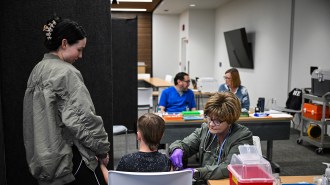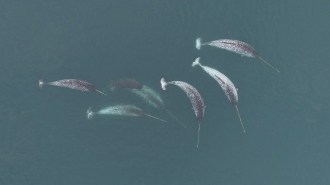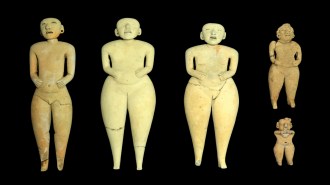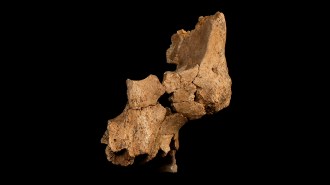News
-
 Health & Medicine
Health & MedicineMeasles is spreading. Here’s what experts say you should know
The uptick in measles cases has left many people wondering about early signs of measles, whether they need an updated vaccine and treatment options.
-
 Health & Medicine
Health & MedicineTherapy dogs can ease young patients’ anxiety in the emergency room
A clinical trial found that spending about 10 minutes with a therapy dog reduced patients’ anxiety in a pediatric emergency room.
-
 Animals
AnimalsNarwhals may use their iconic tusks to play
Videos show narwhals using their tusks in several ways, including prodding and flipping a fish. It’s the first reported evidence of the whales playing.
-
 Space
SpaceThe Blue Ghost lander just witnessed a lunar eclipse — from the moon
The privately-owned lander turned its cameras toward Earth as our planet cast its shadow over the moon. It’s not the first spacecraft to do so.
-
 Life
LifeDark coats may have helped the earliest mammals hide from hungry dinosaurs
During the age of dinosaurs, early mammals probably lacked the stripes and spots of their modern relatives, having uniformly dark, drab coats.
By Jake Buehler -
 Archaeology
ArchaeologyThese ancient Maya-era puppets may have been used in rituals
The puppets, unearthed in El Salvador, have movable heads, strange facial expressions and may have been dressed for ritual roles.
By Tom Metcalfe -
 Chemistry
ChemistryA new iron compound hints ‘primordial’ helium hides in Earth’s core
Earth’s core could contain helium from the early solar system. The noble gas tucks into gaps in iron crystals under high pressure and temperature.
By Skyler Ware -
 Quantum Physics
Quantum PhysicsA quantum computing milestone is immediately challenged by a supercomputer
A quantum processor solved a problem in 20 minutes that would take a supercomputer millions of years. A supercomputer then did a part of it in about 2 hours.
-
 Anthropology
AnthropologyWestern Europe’s oldest face adds new wrinkles to human evolution
Face bones unearthed in a cave suggest that members of our genus, Homo, reached northern Spain as early as 1.4 million years ago.
By Bruce Bower -
 Neuroscience
NeuroscienceParenthood may help the brain stay young
A study of nearly 38,000 adults shows that the number of kids correlates with coordination of brain regions’ activities — regardless of parents’ sex.
-
 Health & Medicine
Health & Medicine6 things to know about antidepressants
An abundance of data show that SSRIs, a class of drugs commonly used as antidepressants, are effective, though, like any drug, they have risks.
By Meghan Rosen and Laura Sanders -
 Planetary Science
Planetary ScienceUranus emits more heat than previously thought
Uranus radiates more energy than it gets from the sun, two new studies find — just as Jupiter, Saturn and Neptune do.
By Ken Croswell